NNMCOP is Located Near A Popular Land Mark And Historical Place Of Up State Ayodhya Of U.P Gonda City Is Located About 38.1 Km For From NNMCOP Might Take 35 Minutes To Each Ayodhya Is Just 9 Km From The Institute May Take A Travelling Time Of 15 Minutes; Gonard Hospital Is Just 1 Km From Thw Institute May .The Capital City Of U.P Is 125 Km (About 3 Hrs) From The Institute.


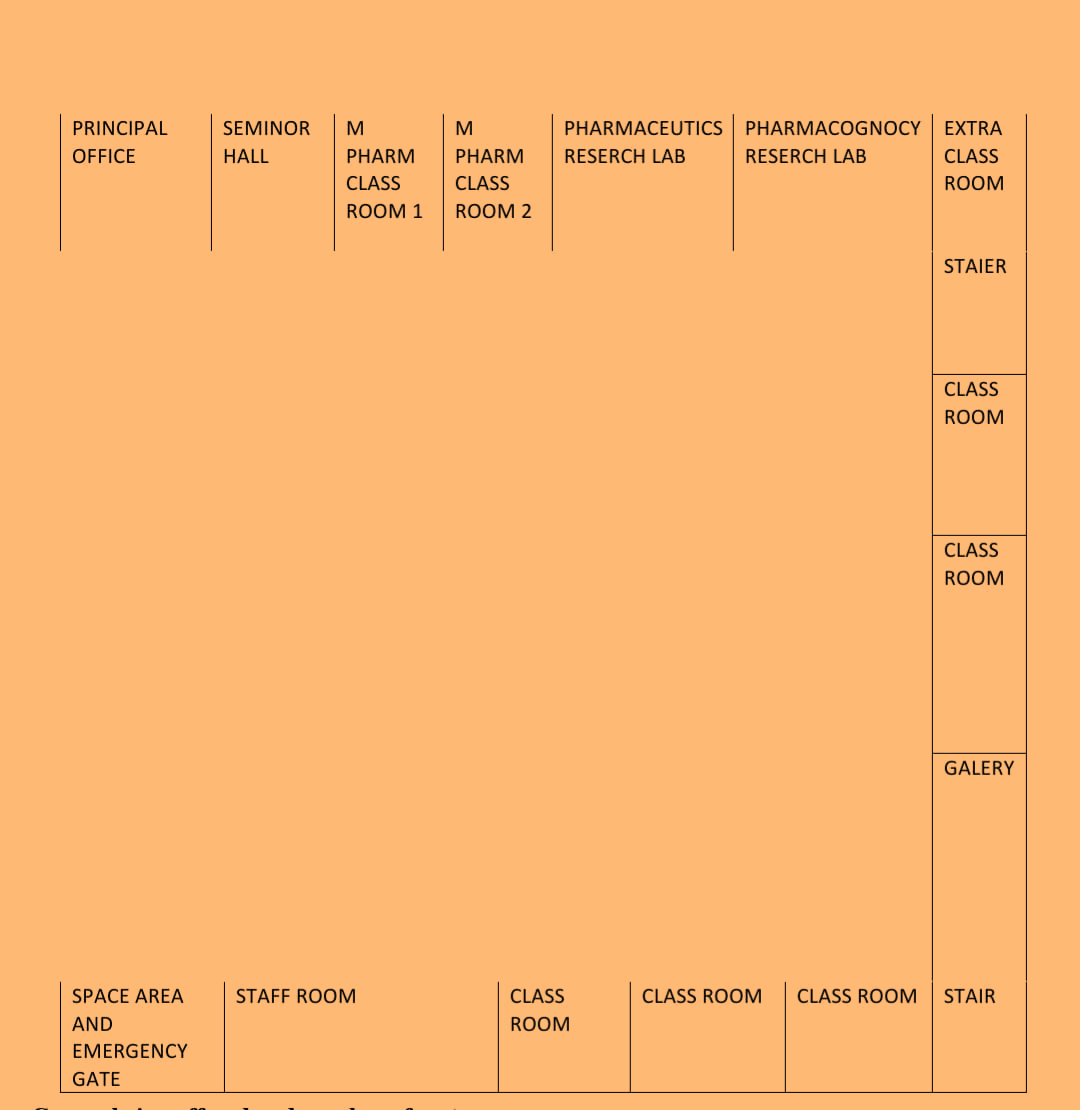
Pharmaceutics is a core part of pharmacy course and is related to the Manufacturing, formulation and dispending of dosage forms or pharmaceutical products. It needs a complete understanding of Physical chemistry, Microbiology, Drug regulatory affairs, Bio-pharmaceutics, chemistry and analytical chemistry.
Pharmaceutics is the core of pharmacy course which provides the knowledge and practice of manufacturing, storage, preservation, utilization and pharmacokinetics of drug products. It includes the study of advanced drug delivery systems, nanotechnology-based delivery systems and biotechnology-based drug delivery systems also.
The department of Pharmaceutics is involved in imparting knowledge in the various fields of advanced pharmaceutics and novel drug delivery systems. The department is well equipped with post graduate research laboratories and an undergraduate laboratory including a well-equipped industrial pharmacy laboratory (Machine room) having all modern equipment essential for carrying our regular as well as research activities in pharmaceutics.
The department in collaboration with other research divisions of the Faculty of Pharmacy and research centres across RUAS is capable of providing a wide range of formulation development activities to facilitate the commercialization of pre-approved active pharmaceutical ingredients, new molecular entities, drug products, and other novel excipients
The Department of Pharmaceutics has a rich tradition of innovation and a commitment to advancing health through new knowledge. Faculty members make significant contributions to enhancing understanding of drug action and delivery. Pharmaceutics is the study of the quantitative aspects of drug delivery. It involves the design, development and evaluation of drugs in combination with an appropriate dosage form. A pharmaceutical scientist:
The PhD Programs in Pharmaceutics prepares students for research in the development and testing of drug products, including investigating interactions of drugs with complex biological systems and the physical and chemical formulation of drugs for delivery. Specializations include:
Pharmaceutics is the science of delivering biologically active compounds to the body through strategies that are designed to elicit an optimal therapeutic response. An understanding of pharmaceutics allows scientists to convert a potential drug into an effective medicine that can be administered to patients in a safe and convenient manner. Our department concentrates on four areas of pharmaceutics:
Our research leads directly to new strategies for maximizing the efficacy of drug therapy while minimizing its potential for toxicity and side effects, or both. At the same time, our research provides new insights into the molecular, cellular, and clinical bases of human disease. This is knowledge critical to improving human health and wellness.
These laboratories provide knowledge about the manufacturing of pharmaceutical preparations and help in training the students in drug formulations like tablets, capsules, parenteral, ointments, creams, eye drops, syrups, drug interaction, stability, shelf-life studies, etc. Different aspects of filling, packing, sealing, and labelling are studied by the students.
The objectives of these labs are to provide practical exposure to the budding pharmacists on Physical Pharmaceutics, Manufacturing Operations, Preformulation Screening Tests, Designing Evaluation and Pharmacokinetic study of solid, liquid, semisolid dosage forms including Novel Drug Delivery. Which curtail the drug dose and minimizes the drug adverse reactions with excellent patient compliance.
The Department is equipped with the state of art laboratories and modern facilities which have been considered as the most sophisticated infrastructure in this region. The Department has different laboratories to deal with the curricular content in the areas of pharmaceutics, physical pharmaceutics, pharmaceutical microbiology, pharmaceutical engineering, pharmaceutical technology, industrial pharmacy and biopharmaceutics in the B. Pharm and D. Pharm
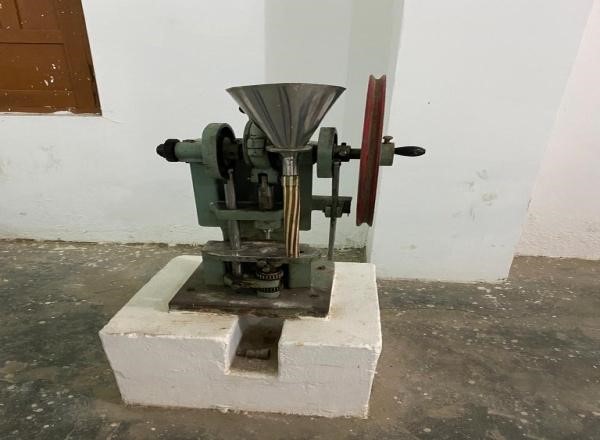
Tablet Punching Machine
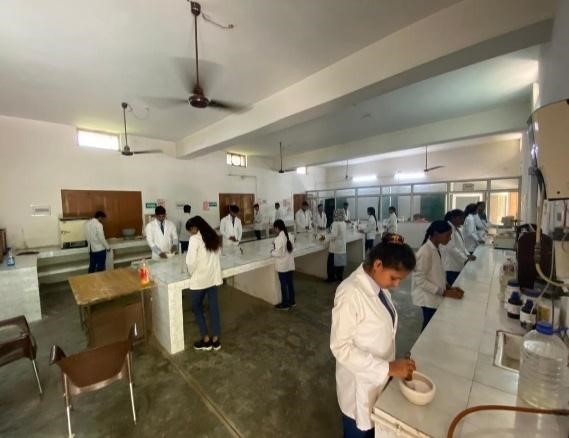
Tritutation of drug
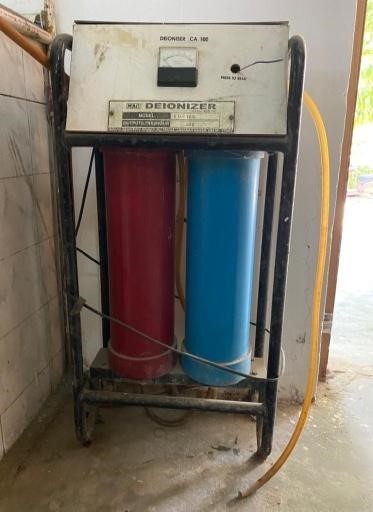
ION exhanger of water
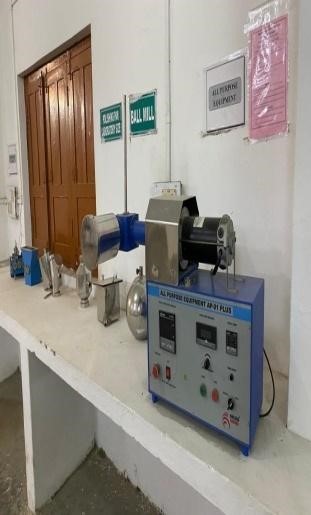
MUltipurpose Equipment
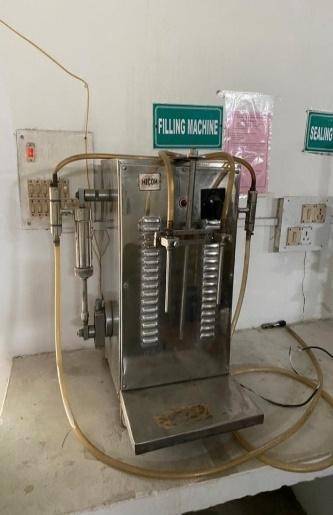
Filling Machine
Pharmaceutical chemistry is a core part of pharmacy course and is related to the design (drug design) and synthesis of biologically active molecule. The aim is to gain new chemical molecules that could enable the discovery of new pharmaceuticals or optimize already known drug structures, thereby to expand the portfolio of chemical drugs. Although organic chemistry plays a crucial role, only knowledgeable pharmaceutical chemists are able to work effectively in a highly interdisciplinary environment and interact with scientists in other disciplines, such as molecular biology, structural biology, pharmacology, physical chemistry, biochemistry, pharmacokinetics, pharmaceutical technology, toxicology or with experts from the field of translational medicine. It needs a complete understanding of Physical chemistry, Microbiology, Drug regulatory affairs, Biopharmaceutical, chemistry and analytical chemistry. Pharmaceutical chemistry is the core of pharmacy course which provides the knowledge and practice of synthesis, chemical structure, chemical nature, composition, preparation, study of physical and chemical properties, methods of quality control and condition of their use.
The subject further sub-divided into various branch like
The department of pharmaceutical chemistry is involved in imparting knowledge in the various fields of advanced pharmaceutical chemistry and novel drug design. The department is well equipped with post graduate research laboratories and an undergraduate laboratory including a well-equipped pharmaceutical chemistry laboratory having all modern equipment essential for carrying our regular as well as research activities in pharmaceutical chemistry.
The department in collaboration with other research divisions of the Faculty of Pharmacy and research centres is capable of providing a wide range of drug design activities to facilitate the new drug research.
The Department of Pharmaceutical chemistry has a rich tradition of innovation and a commitment to advancing health through new knowledge. Faculty members make significant contributions to enhancing understanding of synthesis, identification, physicochemical properties of new drug.
Pharmaceutical chemistry in chemistry as it is the important aspects of making drugs, capsules by reducing their side effects and it is only possible when you have the knowledge of organic chemistry. Pharmaceutical basically address the problem in drug formulation. Pharmaceutical in chemistry has a great career scope in biological companies.
The PhD Programs in Pharmaceutical chemistry will provide in-depth training in pharmaceutical and medicinal chemistry that fosters the discovery and development of novel therapeutic agents, efficient and scalable chemical processes related to synthesis and manufacture and robust testing frameworks for effectiveness and toxicological purposes.
These laboratories provide knowledge about the synthesis, identification and characterisation of pharmaceutical compounds and help in training the students in drug synthesis like Aspirin, Paracetamol, Alkaloids, Pyrazoles, Quinolines, Drug interaction, Stability, Shelf-life studies etc.
The objectives of these labs are to provide practical exposure to the budding pharmacists on Physical chemistry, Organic chemistry, inorganic chemistry, Analytical chemistry of various compounds including pharmacokineticproperties of drugs. Which curtail the drug dose and minimizes the drug adverse reactions with excellent patient compliance.
The Department is equipped with the state of art laboratories and modern facilities which have been considered as the most sophisticated infrastructure in this region.
The Department has different laboratories to deal with the curricular content in the areas of Pharmaceutical chemistry as Physical chemistry, Organic chemistry, inorganic chemistry, Analytical chemistry in the B.Pharm and D.Pharm.
Major Equipment’s Available in Pharmaceutical chemistry lab:
There should be Standard Operating Procedure (SOP) for laboratory entry. Before entering the Lab ensure: -






Pharmacognosy lab provides adequate facilities for morphological and microscopical studies of cells and tissues in different parts like root, stem, leaf, flower, fruit and seed of natural plants, identification and standardization of crude drugs. This lab provides an opportunity for the students to gain the knowledge of physicochemical properties of the natural products and natural medications also the identification tests, extraction, isolation, detection, determination and the estimation of natural products, quantitative and qualitative analysis of drugs and phytoconstituents extracted from medicinal plants. This lab also provides an opportunity for the students to gain the knowledge of plant tissue culture techniques, crop improvement, hybridization and colonal propagation etc.
This lab is well equipped with various instruments like projection microscope, binocular microscope, laminar air flow, incubator, Incinerator, Clevenger’s apparatus,Soxhlet apparatus, Distillation unit, Microtome, tissue culture station, autoclave, hot air oven, water bath with orbital shaker and vortex shaker.






Pharmacology is the science which deals with the study of drugs. The word ‘PHARMACOLOGY’ is derived from the Greek words ‘Pharmakon’ (a drug or poison) and logos (discourse). It broadly covers the information about the history, source, physiochemical properties, and physiological properties, mechanism of action, absorption, distribution, metabolism and excretion of drugs. Drugs are chemical agents used for the purpose of diagnosis, prevention relief or cure of a disease in man or animals. The word drug is derived from the French word ‘drogue’ meaning herb.
Experimental pharmacology is relatively the youngest branch of basic medical sciences. The advancement in the field of electrophysiology, biochemistry, molecular biology and electronic or digital recording systems and software’s have enriched and broadened the horizons of experimental pharmacology.
The main aims of the experimental pharmacology are to:
Since experimental pharmacology involves the discovery of new drugs or to study the action of existing drugs it is done in two main stages
The department in collaboration with other research divisions of the Faculty of Pharmacology and research centres is capable of providing a wide range of drug properties and action activities to facilitate the new drug research.
Pharmacology is one area that is studied by those who are in training to become pharmacists. Pharmacists are experts on medications. They have a variety of roles such as dispensing medications, educating patients on proper use of medications, advising healthcare professionals on which drugs to administer to a patient, and helping to monitor patient health. Pharmacologists conduct research on drugs in a laboratory setting in order to better understand how these substances work and possibly develop them into pharmaceuticals. They study drugs, while pharmacists provide the final product to patients along with information about its use.
Pharmacology work is lab-based. With a bachelor’s degree, one can work as a research technician in a laboratory. Further schooling leading to a master’s degree may lead to positions with more responsibility, such as lab manager or research assistant positions. A PhD is required to be in charge of a lab and design experiments. Labs may be located in universities (where teaching may also be required), pharmaceutical companies, commercial or government-funded research centres, or medical charities. Pharmacologists often specialize in a specific area such as neuropharmacology, cardiovascular pharmacology, or veterinary pharmacology.
The Department of Pharmacology and Molecular Sciences hosts the Pharmacology Graduate Program, which offers a program of study and research leading to the Ph.D. degree. Research training opportunities within the program cover a broad spectrum of biomedical sciences including chemical biology, immunology, virology, cancer, and neuroscience. The mission of departmental research is to understand the molecular processes underlying physiology and pathology, and to apply this knowledge to discovering new drug targets and developing novel therapeutics. Within the program, students may choose to focus their efforts in any of a large number of specific research areas including signal transduction, structural biology and drug design, NMR spectroscopy, molecular genetics, cancer chemoprevention, viral immunosuppression, cancer immunology, cell-mediated immunity, mechanisms of HIV infection, vaccine development, glycobiology, biomedical mass spectrometry, clinical pharmacology, drug delivery, anti-parasite drug development, histone acetylation and gene regulation, melatonin and circadian rhythm, drug metabolism, Vitamin D pharmacology, natural product biosynthesis, telomerase and chromosome stability, T cell activation and tolerance, DNA repair, DNA topoisomerases, molecular imaging, and the clinical pharmacology of cardiovascular agents. The department is also pleased to host students and award doctoral degrees to M.D./Ph.D. degree candidates and students in other Ph.D. graduate programs in which Pharmacology faculty participate (Biochemistry, Cellular and Molecular Biology, Cellular and Molecular Medicine, Immunology, Neuroscience, and Pathobiology).
These laboratories provide knowledge about the Drug information, identification and Laboratory report, about adverse drug reaction, Handling of medical surgical device and aids, Drug -Drug interaction in various disease, etc.
The objectives of these labs are to provide practical exposure to the budding pharmacists on Drug Therapy, ADR Reporting,Case study on Drug -Drug Interaction,WoundDressing,Vaccination and Injection technique Hospital Pharmacy Software and Various Digital Tools.
The Department is equipped with the state of art laboratories and modern facilities which have been considered as the most sophisticated infrastructure in this region. The Department has different laboratories to deal with the curricular content in the areas of Pharmacology asADME, Pharmacodynamics, Pharmacokinetics, and Toxicologyin the B. Pharm and D.Pharm.

Rota rod Apparatus

Histamine chamber

Anagesiometer

Stethoscope

Sphygmomanometer

Spirometer

Nebulizer

Glucometer

Weighing machine

Capillaries Test (for BCT)

Thermometer

Lancet
There should be Standard Operating Procedure (SOP) for laboratory entry.
Before entering the Lab ensure: -
Job Opportunities relevant to their Pharmacology departmentDepartment
Clinical Pharmacology, Immuno-pharmacology, Pharmacovigilance, Environmental Pharmacology, Indigenous Drug Research, Trace elements study, Neuropharmacology, Psychopharmacology and Chemotherapy.

X-Pharm Series software-based Pharmacology experiment







Details of Computer Lab


The Institute has an exclusive library facility for students and teaching staff with total built-up area of 2000 Sq. ft. Our College Library is heart of our institution. It is located at the second floor of the College building in a clean and quiet atmosphere in the campus. Library is managed by Mr. Deept Keerti Tripathi librarian with MLI.Sc Qualification and Mr. Babbu Singh as attender. Library is furnished with wooden reading tables having good lighting system, comfortable chairs and fans. Absolute silence is ensured by library staff, displaying adequate sign boards such as “no mobile usage” and “maintain silence. It has reading room for staff and students with nearly 60 seating capacity. Computers with Internet facility are available along with Printer.
The aim of library is to fulfil the need of relating materials. The books are the foundation stone of library service. The library has a rich stock of books to meet the intellectual and academic needs of both students and staff. The library subscribes to an adequate number of journals and magazines which brings to them the most up-to-date developments in technology along with Pharmacology, Pharmaceutics, Pharmacognosy, Pharmaceutical chemistry etc. The institute has well equipped and furnished library with 10959 books. In addition to this Library has developed an excellent collection of books, journals and e-journals in Pharmaceutics, Pharmacology, Pharmacognosy, Pharmaceutical chemistry and Pharmacy practice, etc. It maintains separate collections of Reference Books, Journals, and Compact Discs.
Students and staffs are instructed for discipline management of library facilities. Students are provided with library card for borrowing books. Students are instructed to check the books while borrowing and they will be responsible for any type of damage at the time of return. Books taken should be returned on or before the due date stamped, if returned late overdue fine will be charged for the delayed period. If the books are lost, then the lender shall replace the books of the same edition or latest edition or pay cost of the book after getting permission from the librarian. Loss of borrower card should be reported to the librarian. Duplicate card may be issued against formal application and fine. No-dues certificate will be issued to students from the library after returning all the books.
Question bank of previous examinations pertaining to all semesters is available in the library. Reference section is available and the books are used by the users.
09:00 AM to 5:30 PM on all working days (Monday to Saturday) Sunday holiday
Librarian: Mr. Deept Keerti Tripathi
Attender: Mr. Babbu Singh
Total Book Strength: 11769
| SECTION | VOLUME | TITLE |
| PHARMACEUTICS | 742 | 140 |
| PHARMACOLOGY | 608 | 88 |
| PHARMACEUTICAL CHEMISTRY | 1587 | 355 |
| PHARMACONGNOSY | 714 | 116 |
| GENERAL BOOKS | 7308 | 1061 |
| TOTAL NUMBERS | 10959 | 1760 |
| REFERENCE BOOKS | 1760 |
Total Journal: 19
| S. No | Name | Publisher |
| 1. | Indian Journal of Pharmacology | Wolters Kluwer India Pvt. Ltd. Mumbai. |
| 2. | Indian Journal of Chemistry | CSIR-NIScPR, New Delhi |
| 3. | Indian Journal of Experimental Biology | CSIR-NIScPR, New Delhi |
| 4. | CSIR News | CSIR-NIScPR, New Delhi |
| 5. | Journal of Scientific & Industrial Research | CSIR-NIScPR, New Delhi |
| 6. | Indian Journal of Traditional Knowledge | CSIR-NIScPR, New Delhi |
| 7. | Indian Journal of Natural Products and Resource | CSIR-NIScPR, New Delhi |
| 8. | Indian Journal of Pharmaceutical Education And Research | Association of Pharmaceutical Teachers of India, Bangalore |
| 9. | Asian Journal of Pharmaceutics | M.Brnss Publication Hub, Mandsaur |
| 10. | International Journal of Green Pharmacy | M.Brnss Publication Hub, Mandsaur |
| 11. | Pharma times | The Pharmaceutical Association, Mumbai |
| 12. | Indian journal of Pharmaceutical Science | The Pharmaceutical Association, Mumbai |
| 13. | Journal Of Journal Remedies | Informatics Publishing Limited, Natural Remedies Bangalore |
| 14. | Indian Journal of Pharmacy Practice | Association of Pharmaceutical Teachers of India Bangalore |
| 15. | International Journal of Advanced in Pharmacological Science | Serials Publication Pvt. Ltd, Dariyaganj, N. Delhi |
| 16. | International Journal of Advanced Drug Delivery | Serials Publication Pvt. Ltd, Dariyaganj, N. Delhi |
| 17. | Indian Journal of Pharmaceutics | Serials Publication Pvt. Ltd, Dariyaganj, N. Delhi |
| 18. | Pharmacognosy Magazine | Saje Publication India Pvt. Ltd, New Delhi |
| 19. | Indian Drug | Indian Drug Manufacturers Association, Mumbai |






Pin Wheel (TABERNAEMONTANADIVARICATA)

Hibiscus (HIBISCUSROSA-SINESIS)

Shatwari (ASPARAGUSRACEMOSUS)

Vinca (VINCAROSEA)

Mango (MANGIFERAINDICA)

Rauwolfia (RAUWOLFIASERPENTINA)

Acalypha (ACALYPHAMECAFICANA)

Amla (EMBLICAOFFICINALIS)

Arjuna (TERMINALIAARJUNA)

Morpankhi (PLATYCLADUSORIENTAILS)
Department of Pharmacognosy has unexclusive medicinal garden provided with medicinal plants ground in area of 250sq. meter under provided with various medicinal plant of pharmacognostical significance. The student of Pharmacognosy used visit the medicinal garden along with subject teacher to have a spot identification and to study the morphology and organoleptic characteristics both as fresh at the garden as well as preserved form in the lab. The medicinal plant as per desired or recommended by the syllabus will be percured from medicinal garden for microscopically and anatomical study.


The Various objects of pharmaceutical significance may have to be studied by pharmacy students and are preserved in the museum which exhibit the cultural heritage of history, development and futuristic events of Pharmacy in a chronological Oder. The museum is provided with various components which were in use and being used in the major department of pharmaceutical sciences. The museum is also acting as a tool which increases and promotes the learning interest of the student by revealing phased technological improvements in the area of pharmaceutical sciences.